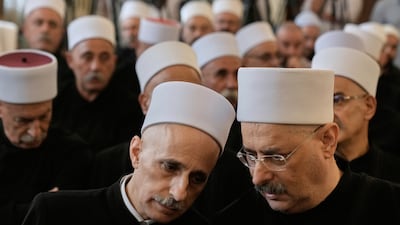The recent comments to this newspaper by the US ambassador to Turkey, special envoy to Syria, and interim envoy to Lebanon, Tom Barrack, about Lebanon’s relations with Syria, worried Lebanese officials. It also underlined why they must normalise relations with Damascus, but also why Syria must work towards the same end.
Speaking about the lack of progress in Lebanon, Mr Barrack said: “I honestly think that they [the Lebanese] are going to say ‘the world will pass us by’. Why? You have Israel on one side, you have Iran on the other, and now you have Syria manifesting itself so quickly that if Lebanon doesn’t move, it’s going to be Bilad Al Sham [Greater Syria] again.”
Mr Barrack quickly corrected the impression that the US intended to sub-contract control of Lebanon to Syria, as was the case in 1976 soon after the beginning of the Lebanese Civil War. However, the damage was done. His statement was soon followed by the fighting in Sweida, where Syrian government forces clashed with the minority Druze community, reviving fears among Lebanon’s non-Sunni communities – Christian, Druze and Shiite – that the leadership in Damascus is hostile to minorities.
The late Lebanese journalist and author Samir Kassir famously wrote: “There can be no freedom for Lebanon without freedom for Syria, and there can be no freedom for Syria without freedom for Lebanon.” His phrase underlined the symbiosis between the two countries, even if their common history has generated great mutual mistrust and antagonism.
Under President Joseph Aoun and Prime Minister Nawaf Salam, Lebanon’s attitude towards Syria today continues to be characterised by uncertainty and the suspicions of the past. Several major issues divide the countries, yet until now there has been little effort to resolve them. Mr Salam is said to be more amenable to reaching an understanding with Syria than Mr Aoun, whose military background makes him warier.
A major issue preventing improved relations is the fate of the approximately 2,100 Syrian detainees in Lebanese prisons, about 1,300 of whom are still awaiting trial, according to Lebanon’s justice minister. The Syrians argue that many were imprisoned unfairly, on the basis of confessions extracted through torture. Just under 10 per cent of them were detained for participating in the Syrian uprising.
The matter is sensitive for both sides because it highlights how previous Lebanese governments tended to collaborate with the erstwhile Assad government in Syria by imprisoning its opponents in Lebanon. Syrian officials today have not forgotten this collaboration, and moreover have condemned the fact that the Syrian prisoners are being held in dire conditions in the decrepit Lebanese prison system.
Lebanese officials have said that the prisoners need to be sentenced first before they can be repatriated, which has delayed a resolution of the problem. Last week, the Lebanese government announced it would not return Syrians accused of terrorism, rape, or attacks against the Lebanese army. As a former armed forces commander, Mr Aoun in particular is not someone likely to being flexible on such issues.
A second bone of contention, this time on the Lebanese side, is that Lebanon continues to host a large number of Syrian refugees. This has represented a major burden for the country’s crumbling infrastructure, especially after the financial collapse of 2019-2020. Yet with Syria still in the midst of a major economic crisis, many of the refugees refuse to return home without guarantees of employment.
There are other issues as well that divide the two sides, such as the presence of Hezbollah in Lebanon and cross-border smuggling – a burden for both the Syrian and Lebanese economies. A major obstacle for many Lebanese remains that the Syrian government has extremist roots, which has prompted fear among officials that its ideological proclivities may extend to Lebanon and harm sectarian relations there.
There have been many rumours that the Syrians have their eye on seizing control of the Sunni-majority Lebanese city of Tripoli. This absurd story has heightened Lebanese anxieties, highlighting how unsettled relations truly are. The Lebanese army and security services remain on high alert for potential extremist influence in Lebanon.
This reflects apprehension among minorities with regard to President Ahmad Al Shara’s administration in Damascus. While certain Lebanese figures have sought to improve ties, including Mr Salam, Abdul-Latif Daryan, the Sunni mufti, and Walid Jumblatt, the Druze leader, their efforts have been not always been welcomed. For example, after the Sweida fighting, Mr Jumblatt was criticised by many of his co-religionists who felt that his endorsement of Mr Al Shara had failed to protect the Druze.

This unhealthy situation makes it imperative that Lebanon and Syria improve their relations. This means addressing their mutual resentments with an open mind, within a context of respect for the sovereignty of the other. This applies as much to Syrian extremists intervening to resolve disputes in remote regions of northern Lebanon as it does to Hezbollah’s efforts to violate Syria's sovereignty by using its territory to re-arm itself.
Allowing the situation to decay further will benefit neither side. Mr Al Shara has to improve his rapport with Syria’s minorities – Kurds, Druze, Christians and Alawites – who represent a substantial portion of the country’s population. Lebanon can play a significant role in such an effort given its own management of sectarian pluralism.
Lebanon, in turn, cannot afford to antagonise Syria, its door to the region, which today enjoys substantial regional backing as well as support from the US. The Lebanese must work towards a modus vivendi, one that stabilises the relationship and helps neutralise cross-border actions from one side that cause negative repercussions in the other.



